How Sleep Inertia Kills Morning Productivity (And How to Fix It)
Sleep inertia can severely impact morning productivity. Learn how to combat grogginess and boost your energy for a more effective start to your day.

Sleep inertia is the grogginess you feel after waking up, cutting your decision-making ability to just 51% and slowing mental clarity for up to 2 hours. It’s caused by waking during deep sleep, poor sleep quality, or disruptions to your body clock. Here’s how to fix it:
- Wake Smart: Use alarms that sync with light sleep stages.
- Morning Boost: Drink water, get natural light, and move around.
- Timed Caffeine: Try delayed-release caffeine pills like Zest’s Wake Up Pill for energy right at wake-up.
- Sleep Better: Stick to a consistent schedule and keep your room cool, dark, and quiet.
For a quick fix, delayed-release caffeine can help you feel alert faster. Want to avoid groggy mornings? Focus on better sleep timing and a strong morning routine.
What Sleep Inertia Does to Your Body
Sleep inertia affects more than just your energy levels - it's a state that temporarily hinders your ability to function right after waking up.
Sleep Inertia Basics
When you wake up, your ability to make decisions drops to just 51% of normal levels, and even after 30 minutes, it's still 20% below your best.
Key symptoms include:
- Weakened visual attention and spatial memory
- Sluggish reaction times and reduced motor skills
- Feelings of confusion and disorientation
- Slower thinking and reasoning abilities
The effects can last anywhere from 15–30 minutes to several hours.
These challenges provide a foundation for understanding what triggers sleep inertia and how it impacts daily life.
Why Sleep Inertia Happens
The intensity of sleep inertia depends on several factors, such as the sleep stage you're in when you wake up, your internal body clock, sleep quality, and whether you're a morning or evening person. Here's a breakdown:
| Factor | Effect on Sleep Inertia |
|---|---|
| Sleep Stage | Waking from deep sleep leads to stronger symptoms |
| Circadian Timing | Symptoms are worse during the biological night when melatonin levels are high |
| Prior Sleep Quality | Poor sleep makes symptoms more severe |
| Chronotype | Morning people recover in about 10–20 minutes, while night owls may need 30+ minutes |
Impact on Work Performance
Studies reveal that immediately after waking, your performance can be worse than after being awake for 26 straight hours.
Complex tasks - like critical thinking or making important decisions - are hit the hardest. Simple physical tasks may bounce back more quickly, but the delay in mental sharpness creates a risky period where judgment and productivity are significantly compromised.
Recovery follows a gradual curve, with alertness and reaction times improving steadily within the first hour. Specifically, alertness and reaction times show exponential improvement, with average recovery times of 0.45 and 0.3 hours, respectively.
This highlights the importance of finding ways to minimize the effects of sleep inertia, which we'll dive into in the next section.
Sleep Inertia Biology
Sleep Cycles and Wake Timing
Your brain moves through sleep stages in 90-minute cycles. If you wake up during deep sleep (Stage 3), you're likely to feel heavy grogginess - this is sleep inertia at work. Even if you've had enough rest, waking at the wrong point in your cycle can leave you sluggish.
Here's how wake timing affects your performance:
| Wake-up Timing | Impact on Performance |
|---|---|
| During Deep Sleep | Severe drop in performance |
| 30 Minutes After Waking | Still about 20% below optimal performance |
| During Light Sleep | Quick recovery, minimal inertia |
| End of Sleep Cycle | Little to no sleep inertia effects |
These patterns reflect shifts in brain activity and chemicals, which we'll explore next.
How Brain Chemicals Work
Sleep inertia intensity is tied to the activity of certain brain chemicals. One key player is adenosine, a compound that promotes sleepiness and contributes to the grogginess many feel upon waking.
"Caffeine works by blocking adenosine receptors in the brain, increasing alertness and wakefulness." - Dr. Michael Breus, Clinical Psychologist, Sleep Medicine Expert
When you wake up, your brain doesn't reboot instantly. Instead, it goes through a gradual process:
- Delta wave activity stays elevated for a while
- Neural activity patterns slowly return to normal
- Adenosine levels decrease over time
This slow adjustment explains why you might not feel fully awake right away. These chemical changes also tie into the hormonal rhythms that influence your mornings.
Body Clock and Morning Hormones
Your internal clock, or circadian rhythm, controls a daily hormone cycle that impacts morning alertness. Cortisol, often called the "wake-up hormone", plays a big role in shaking off sleep inertia.
"Cortisol is a stimulating, alerting hormone. It's the body's primary stress hormone." - Dr. Michael Breus, Clinical Psychologist, Sleep Medicine Expert
Here's how the typical morning hormone cycle works:
- Cortisol levels start to rise 2–3 hours before you naturally wake
- Levels peak around your usual wake-up time
- Cortisol gradually declines throughout the day
- It reaches its lowest point around midnight
When this rhythm is disrupted - maybe from an irregular sleep schedule or external stressors - sleep inertia can feel worse. Cortisol helps suppress melatonin and block existing adenosine levels, but this process takes time. This is why you can't instantly go from asleep to fully alert.
5 Ways to Beat Sleep Inertia
Sleep inertia can make mornings tough, leaving you groggy and less productive. Here are some science-backed strategies to help you shake off that morning fog.
Delayed-Release Caffeine Options
Regular coffee doesn’t always kick in fast enough to help you feel alert right when you wake up. That’s where delayed-release caffeine comes in. For example, Zest Labs has developed a wake-up pill that releases caffeine 7–8 hours after you take it at night, so you wake up feeling more energized.
Here’s how different caffeine delivery methods compare:
| Method | Release Time | Duration | Side Effects |
|---|---|---|---|
| Regular Coffee | 20–30 minutes | 4–6 hours | Possible jitters, afternoon crash |
| Delayed-Release | 7–8 hours | 2-hour gradual release | Minimal crash risk |
| Continuous Sipping | Variable | Unpredictable | Dehydration, sleep disruption |
While caffeine can help, refining your morning routine can also make a big difference.
Better Morning Habits
What you do right after waking up sets the tone for your day. Try these simple steps to feel more awake:
- Get Some Light: Step outside or open the curtains to soak in natural light. It helps wake up your body by boosting cortisol and reducing melatonin.
- Rehydrate: Drink a glass of water first thing in the morning to counter dehydration.
- Move Around: Light stretches or a quick workout can get your blood flowing and lift your energy.
- Cool Down: A cold shower or even splashing cold water on your face can give you an instant wake-up boost.
Improving your sleep quality is another key element in reducing sleep inertia.
Sleep Quality Improvements
Better sleep means easier mornings. Here are a few tips to improve your sleep and reduce grogginess:
- Smart Alarms: Use a smart alarm that wakes you during a lighter sleep stage, making it easier to get up.
- Cool Environment: Keep your bedroom cool for better sleep and less morning sluggishness.
- Stick to a Schedule: Go to bed and wake up at the same time every day - even on weekends - to keep your body’s internal clock on track.
Delayed-Release Caffeine Guide
How Timed Caffeine Works
Delayed-release caffeine capsules are designed to kick in right as you wake up. Unlike the typical 20–30 minute wait for coffee to take effect, these capsules release caffeine during the sleep-wake transition, helping combat morning grogginess, also known as sleep inertia. Here's how it works: during sleep, adenosine builds up in your brain to support deep rest. Timed caffeine blocks adenosine receptors at just the right moment, helping you feel alert. For example, a 160mg dose taken at 10:30 PM showed improved reaction times and mood within 15 minutes of waking at 7:00 AM. This precise timing syncs with your natural wake cycle, giving you a productivity boost right out of bed.
Product Comparison
Now that you know how it works, let’s look at some popular delayed-release caffeine products:
| Product | Release Timing | Caffeine Content | Key Features | Price |
|---|---|---|---|---|
| Zest Wake Up Pill | 7–8 hours | 80mg | Gradual 2-hour release; includes B vitamins and zinc | $59.95/30 servings |
| zümXR Delayed Release | 2 hours | Varies | Over 80% released at 2 hours | Varies by manufacturer |
| zümXR Extended Release | 6 hours | Varies | 55% released at 1 hour, 80% by 6 hours | Varies by manufacturer |
For best results, Zest's Wake Up Pill should be taken on an empty stomach about 7–8 hours before your planned wake-up time. Keep in mind that factors like eating can influence how the caffeine is released, so staying consistent with your routine is important. If you’re mainly looking to shake off morning grogginess, a product that releases caffeine 7–8 hours after ingestion is a solid choice. On the other hand, if you need steady energy throughout the day, an extended-release option like zümXR’s 6-hour version might suit you better. Interestingly, research shows that 92% of users are willing to pay extra for multi-phase energy solutions. Some newer products even use advanced micro-bead technology for more precise release timing.
Conclusion
Key Takeaways
Sleep inertia can significantly reduce productivity for up to 2 hours after waking. Over one-third of adults get less than 7 hours of sleep each night, leading to a higher chance of experiencing prolonged grogginess. On average, workers lose 11 days of productivity each year due to sleep-related problems. To tackle sleep inertia effectively, focus on three areas: timing, sleep environment, and caffeine use.
Stick to a consistent wake-up time to avoid worsening sleep inertia. Create an ideal sleep setting by ensuring your bedroom is dark, quiet, and cool. For those needing an extra boost, delayed-release caffeine products, like Zest's Wake Up Pill, can help by releasing caffeine 7–8 hours after consumption, syncing with your natural wake-up time.
By integrating these strategies, you can improve your mornings and regain lost productivity.
Steps to Take
- Optimize Your Sleep Space: Keep your bedroom cool, dark, and quiet.
- Start Your Day Right: Drink 8–16 oz of water as soon as you wake up and get 10–15 minutes of exposure to natural light.
- Try Timed Caffeine: If grogginess persists, consider delayed-release caffeine options like Zest's Wake Up Pill. Follow the recommended dosage for best results.





